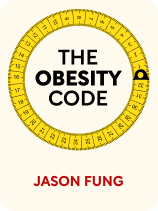

This article is an excerpt from the Shortform book guide to "The Obesity Code" by Jason Fung. Shortform has the world's best summaries and analyses of books you should be reading.
Like this article? Sign up for a free trial here .
Does intermittent fasting work for obesity? How long should you fast to induce weight loss?
According to Canadian nephrologist Jason Fung, intermittent fasting is the key to beating obesity. Intermittent fasting is an eating pattern wherein you intentionally stop eating for a stretch of time. Research has shown that regular fasting reduces insulin resistance, lowering your set weight and allowing you to steadily lose fat.
Here’s how intermittent fasting can help you put an end to obesity once and for all.
Intermittent Fasting and Weight Loss
In the short term, most diets produce weight loss. However, dieting alone can’t fix obesity, because dieting doesn’t lower your set weight. Once you fall beneath that set weight, your body will compel you to eat and regain any weight you’ve lost.
According to Jason Fung, intermittent fasting in combination with a healthy diet can heal insulin resistance, which is at the heart of obesity. Fung explains that when you fast beyond 24 hours, insulin levels fall and your body begins to derive energy from your stored glycogen and fat. Beyond two to three days, ketosis kicks in: Fat becomes your body’s main energy source, producing three energy molecules—glucose, fatty acids, and ketones—that fuel your body and brain. (Shortform note: Stephens calls ketosis your “fat-burning superpower,” and she encourages people to embrace fasting as an enjoyable lifestyle rather than self-deprivation. In Stephens’s view, the benefits of fasting vastly outweigh not eating as often—and she says that in time, you won’t even want to eat all the time.)
(Shortform note: In Fast. Feast. Repeat., Gin Stephens explains that long-term dieting causes “diet brain,” a mindset condition wherein you become disillusioned with dieting as a solution to weight loss. She agrees with Fung that intermittent fasting is the solution to obesity—specifically, she recommends Alternate-Day Fasting and suggests trying various lengths until it feels right for you. While Stephens is not a health professional, she’s run several online support groups that have helped thousands of people overcome obesity.)
According to Fung, fasting is a time-honored practice that humans have used to maintain good health for thousands of years. During our hunter-gatherer past, food was periodically scarce. To handle this, our bodies adapted to store fat as a back-up energy source in times of need. Since then, physicians in ancient cultures, such as ancient Greece, have lauded fasting as a powerful cure for many illnesses. Many religions prescribe fasting as a regular “purification” practice, and over three billion Muslims, Christians, and Buddhists fast as a normal part of life.
(Shortform note: Some researchers argue that we shouldn’t romanticize the idea that our ancestors fasted for health. The natural environment provided an abundance of food during most seasons, and fasting for days or weeks was rarely necessary. Further, our ancestors wouldn’t have fasted unless necessary, such as if famine or disaster struck. Voluntary religious fasting began after the agricultural revolution, when we had the certainty of stored food.)
While some worry that fasting is unhealthy, Fung explains that these concerns are misplaced. He argues that fasting does not cause your body to consume your muscles for fuel, damage your metabolism, deplete your blood sugar, or deprive you of essential nutrients. In contrast, studies show that fasting regulates blood sugar and electrolytes, produces an increase in human growth hormone that conserves your muscles, and increases your metabolism once ketosis kicks in. For these reasons, Fung asserts that anyone can fast successfully and reap powerful health benefits.(Shortform note: Some bodybuilders use intermittent fasting to accelerate muscle gain and stay lean. This happens because fasting changes your body composition, or the ratio of muscle to fat. Your body preferentially burns fat while pumping up human growth hormone, and some believe that leveraging this to stay lean while building muscle is the optimal way to work out.)

———End of Preview———
Like what you just read? Read the rest of the world's best book summary and analysis of Jason Fung's "The Obesity Code" at Shortform .
Here's what you'll find in our full The Obesity Code summary :
- Why everything we were taught about obesity is wrong
- The theory of obesity as a hormonal disorder that causes overeating
- Why dieting doesn’t work and exercise actually has little impact on weight loss



![Charlie Munger’s 8 Secrets to Living a Good Life 8 Secrets to Living a Good Life [Charlie Munger]](https://www.shortform.com/blog/wp-content/uploads/2021/06/good-life-morning-coffee-270x270.jpg)


